Holidays with Enya
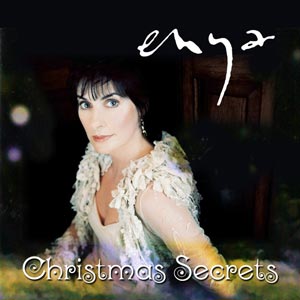
Christmas Secrets
The ultimate compilation
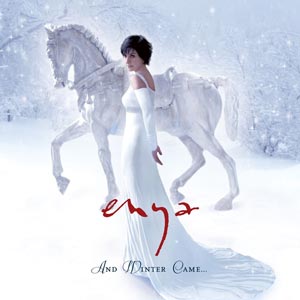
And Winter Came...
A winter-themed album
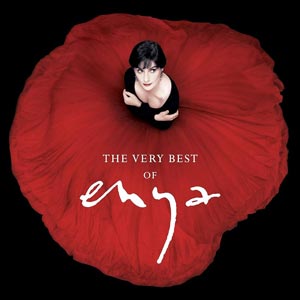
The Very Best of Enya
The perfect gift
Clannad, the Enya's family band

Clannad is a Grammy Award-winning Irish musical group, formed by several siblings of Enya. They have adopted various musical styles throughout their history, including folk, folk rock, traditional Irish, Celtic and New Age music, often incorporating elements of smooth jazz and Gregorian chant. They are known for performing in various languages, including English, Latin, Gàidhlig, Mohican and most of all in their native tongue, Irish.
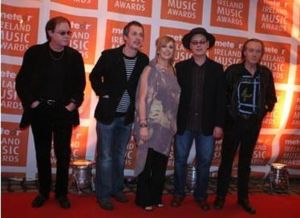
Clannad at the Ireland Music Awards.
Formed by siblings Ciarán Brennan, Pól Brennan and Moya Brennan and their twin uncles Noel and Pádraig Duggan, the band were initially known as Clann as Dobhar; in 1973 they shortened their name to Clannad. By 1979 they had released three albums and completed a successful US tour. From 1980 to 1982, they recorded and toured as a six-piece group with Enya on additional keyboards and vocals, before she left the group to pursue a solo career.
Members
Current members
- Ciarán Brennan: bass, guitar, keyboards, mandolin, vocals (1970-present)
- Moya Brennan: vocals, harp (1970-present)
- Pól Brennan: flute, guitar, percussion, whistles, vocals (1970-1990, 2011-present)
- Noel Duggan: guitar, vocals (1970-present)
Former members
- Pádraig Duggan:guitar, mandola, mandolin, vocals (1970-2016; his death)
- Enya: percussion, keyboards, vocals (1980-1982)
Enya's siblings
Clannad was formed in 1970 by siblings Ciarán Brennan, Pól, and Máire Brennan and their twin uncles Noel and Pádraig Duggan. The five grew up in Dore, an area of Gweedore, a remote parish in County Donegal in the northwest corner of Ireland. It is a Gaeltacht region whereIrish is the main spoken language. Raised as a Roman Catholic family of musicians, the Brennans' mother, Máire "Baba" Brennan (née Duggan), was a music teacher while their father, Leo Brennan, was a member of the Slieve Foy Band, an Irish showband. Later in their careers the two bought and ran Leo's Tavern, a pub in nearby Meenaleck where the Duggan and Brennan children would perform covers of songs by the Beatles, the Beach Boys, and Joni Mitchell.The band adopted the name Clann as Dobhar, Irish for 'Family from Dore', when they entered a local music competition, and they used that name until 1973. The Brennans' and Duggans' interest in traditional Irish music reached beyond their native Gweedore, and they performed elsewhere including Tory Island, off Donegal's coast. Armed with some 500 Gaelic songs, they would later begin to arrange these songs for a full band.
Moya Brennan, Enya's sister
Moya Brennan (born Máire Ní Bhroanáin), also known as Máire Brennan, is an Irish folk singer, songwriter, harpist, and philanthropist. She began performing professionally in 1970 when her family formed Clannad, and is considered as the "First Lady of Celtic Music". Moya released her first solo album in 1992 called Máire. She has been nominated for two Grammys and has won an Emmy Award. She has recorded music for several soundtracks, including Titanic, To End All Wars and King Arthur.
Clannad's history
In 1982, Clannad attracted international attention with their hit single "Theme from Harry's Game", which was included on Magical Ring (1983). They adopted a musical direction of Celtic and pop music in the 1980s and 1990s, as evident on Macalla (1985), and Anam (1990). After Landmarks (1997), the band were on hiatus before the original line-up reformed in 2007 before a four-piece of Moya, Ciarán, Noel, and Pádraig completed a full-scale tour in 2008. They then released Nádúr (2013), their first studio album in fifteen years. Pádraig Duggan died on 9 August 2016.
In 2019, Clannad embarked on their In a Lifetime farewell tour, but it was postponed in March 2020 due to the COVID-19 pandemic. A new compilation album entitled, In a Lifetime which included two new tracks, was released.
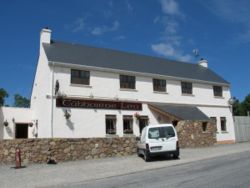
Leo's Tavern (or Tábhairne Leo), the family's pub where Clannad developed their talent, as can be seen in 2007. (Show bigger image)
Clannad has won numerous awards throughout their career, including a Grammy Award, a BAFTA, an Ivor Novello Award, and a Billboard Music Award. They have recorded in six different languages,[10] and scored eight UK top-10 albums. They are widely regarded as a band that have brought Irish music and the Irish language to a worldwide audience, often experiencing more popularity abroad than in their native Ireland.
The name "Clannad" comes from Clann As Dobhar, meaning "the family from Dore".
Discography
Clannad (The Pretty Maid)
The first album was recorded in 1973, simply called Clannad (or The Pretty Maid) and showed a band aware of contemporary Irish music of the day. There were hints of modern influences, showing the band's ability to form contemporary, jazz influenced versions of traditional material.
Clannad 2
The second album followed in 1975. Produced by Planxty and Bothy Band founder Dónal Lunny, it showed a tremendously more mature band that was quite committed to singing mainly in Irish.
Dúlamán
The following year they produced Dúlamán, which probably was the high point of their albums of solely traditional material. The title track was a song about two dúlamán, or seaweed merchants, one of whom is trying to win the hand of the other's beautiful daughter. It has been a favourite of Clannad's live shows for a very long time.
Crann Úll
The band's next album was Crann Úll (Irish for "apple tree") released in 1978. It featured a stronger emphasis on Máire's harp-playing. On "Gathering Mushrooms" they included their sister Eithne N� Bhraon�in (Enya herserlf) supporting vocals.
Fuaim
In 1981 with the album Fuaim (pronounced "foom", meaning sound), Clannad began to experiment with a more lush and electric sound. Enya became, for a short time, a full member of the band, adding keyboards and harmony vocals as well as lead vocals on two songs, "An Túll" and "Buaireadh an Phósta". This album marked Clannad's first experiments with synthesizer. The following year Enya left to pursue her solo career.
Magical Ring
Clannad were signed up to RCA Records when they were approached and asked if they would be interested in doing a song for a fictional drama on British television, depicting the Troubles in Northern Ireland. Ciarán, Pól and Máire got together and wrote the now-legendary song "Theme From Harry's Game". Entering the British charts at number 5, it remains the only hit single in the UK ever to be sung entirely in Gaelic. The album Magical Ring was a huge turning point in Clannad's career, it was the start of their international career. It contained half traditional material and half original recordings.
Legend
Shortly after Magical Ring, Clannad were asked to provide music for the television series Robin Of Sherwood. They once again began to stretch themselves, creating music for a range of characters and events. For the first time ever, they produced an album without any of their native Irish, as the story was set deep in English folklore. Legend (1984) won the band a BAFTA award, the first time an Irish act had been honoured thus.
The musical style of the album was dominated by guitar riffs and trumpet reverberations. Songs such as "Now Is Here" stood as testament that Clannad could produce mellow and delicate tracks alongside tempestuous and piercing songs such as "Battles".
Macalla
Macalla (echo in Irish) was released in 1986, Clannad's most critically acclaimed album ever. It contained all original material except one traditional song and yielded the group a hit single "In A Lifetime", a duet with U2's Bono. The album opens with the song "Caisleán Óir", its haunting Irish lyrics and earthy mood has helped define Clannad's sound as overwhelmingly ethereal. In "Buachaill Ón Éirne" they took a traditional Irish song from their native Donegal and handled it with great tenderness and understatedness. It was the first time ever such a song featured on a chart-topping comercial album, something Clannad went on to pioneer in.
Sirius
The following album, Sirius, released in 1988, was recorded in Los Angeles with rock producers Greg Ladanyi and Russ Kunkel. Therefore it became clear that it was going to be Clannad's most adventurous project yet. The title track was Pól Brennan's encouraging call to the environmental movement, and to the Greenpeace ship of the same name. One of the more successful songs from the album was "Something To Believe In", another meditation on life's dark moments.
Received with critical apprehension, Sirius was initially, stoutly defended by the band as a change, but since the members have expressed their disappointment with the album and even Pól Brennan apologised on its behalf. Despite this, the following year they embarked on their first world tour and within a year the album had become their best selling work to date.
Atlantic Realm, The Angel and the Soldier, Past
Present and The Collection
Between 1988 and 1991 there were some side projects for the band, including Atlantic Realm (1989), a small album made for a BBC documentary about the Atlantic Ocean, and The Angel and the Soldier (1990), a half hour animation, without voice overs and the music told the story. Both albums proved to be a minor success, and also demonstrated once again that Clannad were one of the most acclaimed soundtrack artists in the music industry.
Also, two greatest hits albums were released at around this time: Past Present, which to date is the only "greatest hits" compilation so far by the band to include any original tracks, and The Collection, which also included five earlier tracks from their more traditional Irish period.
Anam
1991's Anam marked a return to the Clannad sound of such albums as Magical Ring and Fuaim and was recorded in just two and a half months at the band's home studio in the hills of Dublin. Anam means "Soul" in Irish and the album's 10 songs showed the usual blending of their traditional roots, their rockier later-period and their ethereal sound.
Banba
Released in 1994, Banba became Clannad's 13th studio album and was greeted with rave reviews and the band's first Grammy nomination. The album jogged comfortably to the number one spot in the World Music Chart. Banba is a romantic mythical name for Ireland. The track "I Will Find You" was especially written for the film The Last of the Mohicans, Máire sings in Mohican and Cherokee. Moya Brennan described the album as "a fusion of various styles of music, growing out of a traditional Gaelic root". Banba has been described as one of Clannad's most visual albums, and has sold over 1 million copies to date.
Lore
Lore (1996) gave some thought to the Native American Indians. On "Trail of Tears", Noel Duggan imagines how it felt to be exiled from one's ancestral land, he was also thinking about these people and their connection with the Irish. It opens with the haunting "Croí Cróga" ("braveheart" in English) which was written as a theme tune for the Mel Gibson film of the same name but which, for unknown reasons, never made it onto the soundtrack. Lore contained a strong jazz element, with songs such as "Seanchas" displaying their unique talent at blending various contemporary sounds with traditional Irish music and the Irish language.
Landmarks
After 25 years of recording ground-breaking music, Clannad returned in 1997 with another all round successful album, Landmarks. The record, was sited in the heartland of Donegal, shaped by the mountains, the glens and the sea-lashed shores of Gweedore. In the song "Of This Land", Máire sings about Ireland, of its past and of its future. The track "Fad�" (translates as Long Ago), demonstrates the influences of old Celtic history on Clannad's music. It won a Grammy award for Best New Age Album, Clannad's third Grammy nomination.
Nádúr
Nádúr (Irish for "nature") is the most recent studio album by Irish folk group Clannad, and was released digitally worldwide on 20 September 2013 and physically within the following week or two, depending on the country. It was the first new studio album since Landmarks in 1998, and the first to feature all five original members of Clannad since the compilation album Past Present in 1989. It is also the last to feature Pádraig Duggan who died on August 9th 2016.